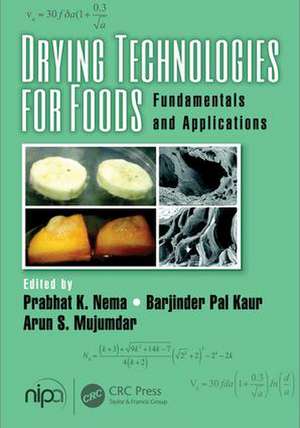Drying Technologies for Foods: Fundamentals and Applications
Editat de Prabhat K. Nema, Barjinder Pal Kaur, Arun S. Mujumdaren Limba Engleză Hardback – 26 noi 2018
Comprehensive yet concise chapters cover different types of drying technologies; this book describes freeze, heat pump, spray, superheated steam, microwave drying and many other drying technologies. Discussion of specific food-related drying including drying of fruit, leather, medicinal herbs, cocoa and coffee beans, mushroom, and protein among others are covered in the book. Chapters are also presented on quality of dried food such as degradation mechanism and kinetics of vitamin C, antioxidants, delinquencies and caking phenomena. Control and safety, energy calculations, modeling are also included with emphasis on industrial applications. Artificial Neural Networks and computational modeling techniques as well as application of computer vision in food drying followed by a chapter on advances in food dryer are covered in some detail, again highlighting potential applications.
Preț: 953.55 lei
Preț vechi: 1341.96 lei
-29% Nou
182.47€ • 191.14$ • 151.22£
Comandă specială
Livrare economică 19 martie-02 aprilie
Specificații
ISBN-10: 1138733083
Pagini: 789
Ilustrații: 290
Dimensiuni: 178 x 254 x 44 mm
Greutate: 1.7 kg
Ediția:1
Editura: CRC Press
Colecția CRC Press
Public țintă
Professional ReferenceCuprins
Notă biografică
Descriere
Drying is an important unit operation used in industry for processing and preservation of food products. Although a large volume of technical literature is available on drying of foods, it is still challenging for scientists and engineers to improve continuously upon the quality of dried products and existing drying systems. This book will aid processors in their search for cost-effective and energy-efficient drying techniques allowing them to succeed commercially in their ventures as well as to fulfill consumer-demand for high-quality products.
Drying Technologies for Foods contains state-of-the art knowledge on several key aspects of drying ranging from fundamental principles, classification and selection, different types of conventional and modern techniques, drying of different food materials, advances in packaging of dried products, control and safety, energy calculation, modeling to advances in food drying. Comprehensive yet concise chapters cover different types of drying technologies; this book describes freeze, heat pump, spray, superheated steam, microwave drying and many other drying technologies. Discussion of specific food-related drying including drying of fruit, leather, medicinal herbs, cocoa and coffee beans, mushroom, and protein among others are covered in the book.
Chapters are also presented on quality of dried food such as degradation mechanism and kinetics of vitamin C, antioxidants, delinquencies and caking phenomena. Control and safety, energy calculations, modeling are also included with emphasis on industrial applications. Artificial Neural Networks and computational modeling techniques as well as application of computer vision in food drying followed by a chapter on advances in food dryer are covered in some detail, again highlighting potential applications.
